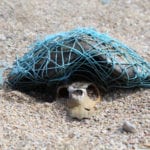So it’s somewhat reassuring to hear she’s optimistic about humanity’s capacity to innovate, adapt and find solutions to saving what’s left – particularly when it comes to the ocean.
She’s channelled that optimism into the extraordinarily compelling and provocative Blue, a feature length documentary in cinemas at the moment and available for streaming online from 11 November.
The film follows seven ‘ocean warriors’ in a number of different locations to explore how human consumption, waste and industrialisation are affecting the ocean via habitat destruction, species loss and pollution. It is beautifully shot – although such shots are not always beautiful to watch. And while confronting, challenging and even sad, it also delivers a powerful message on how anyone can personally take action.
Watch this film and there are some things you may never do again: purchase coffee in takeaway cups; use a Nespresso coffee pod; enjoy endless plastic bags or even endless plastic anything. And if you eat tinned tuna or any kind of shark-fin product, then you’ll likely be searching for new lunch options.
The film, along with its promotional materials, carries figures that are difficult to forget: Notably that half of all marine life has been lost in the past 40 years, and that by 2050 there will be more plastic in the sea than fish.
Karina’s optimism stems from the ‘warriors’ she’s met – including the seven whose story she follows in the film.
“I wanted to find really energetic, young, enthusiastic people, who were fighting and making a difference, not because they had money or big organisations, but because they had gone out there and become active, and were moved,” Karina told me. “I felt like we could see ourselves in them. The better part of ourselves might be reflected in them.’
One such warrior she worked with was 24-year-old Madison Stewart, also known as “shark girl”. The film features Madison swimming with sharks, and then photographing the slaughter of sharks for their fins in a fishing village.
Another warrior, responsible for some of the most moving imagery, is Valerie Taylor, who shares with Karina footage of the Great Barrier she shot back in the 1960s and 70s. The pictures are simply stunning, showcasing the brilliant colour and life of the reef – a significant portion of which has since been destroyed, especially though catastrophic bleaching (caused by warming waters).
“She’s a legend,” Karina tells me. “I was always slightly intimidated by her, my mother knew her growing up. I felt like I was approaching somebody who was such a stateswoman when I invited her to be involved.”
Valerie also happened to live down the road from Karina on Sydney’s Northern Beaches. Karina describes approaching her and taking her out diving, and then discovering she had numerous film canisters featuring diving footage from decades ago – the footage was yet to be digitalised. “They were turning into vinegar. We offered to pay for the cleaning to turn them into digital media. We did that and then ended up with a hundred or more hours of footage.”
Karina appealed for funding of the film in August 2015, at the Good Pitch competition at the Opera House. “By the time we got there, we had already been working on it for several months and we had two minutes to stand up and pitch to the 400 philanthropists,” she says. The gathered philanthropists were impressed, and offered generous support.
The entire film was shot in 30 days with cinematographer Jody Muston, across locations including Cape York, Indonesia, Hawaii and the Philippines, the Great Barrier Reef and Lorde Howe Island.
The film’s message is so compelling, that’s it’s been aired in front of a meeting at the United Nations. “You are standing there in front of these world leaders who are making these important decisions and you just think, ‘if I can lay it all on the table they will get it.”
Karina was born in Avalon on Sydney’s Northern Beaches, before later moving to a farm in the Southern Highlands, and then studying science at Sydney University. She got started in film and television during a stint at the ABC’s Natural History Unit where she made programs about nature, before going on to make films for National Geographic. She currently works full-time with Northern Pictures, and was given the support to make Blue on the side.
While the subject matter of Blue is confronting and challenging, Karina believes children can watch it and be moved. When she first saw kids as young as five in the crowd at film festivals, she wondered how they would handle it. “But they stayed until the end without any wriggles. They were breathless and they asked beautiful questions. I think sometimes we protect our children from things that are happening in the real world. We are quite happy for them to watch cartoons with violence, but then get concerned when they are confronted with reality.”
She says the key is to deliver difficult messages to children in a way that empowers them to take action and feel they can be part of a solution.
Karina certainly feels empowered, despite spending so much time filming marine life and oceans that have been so harmfully affected by human behaviour.
“I’m highly sceptical but also optimistic,” she says. “I don’t know if that’s just my nature. I am so inspired by passionate people who don’t give up and, knowing the world is in a state of flux, they seek to change the direction.”
She also believes there’s hope for the Great Barrier Reef, although it will continue to change and some species will disappear. What matters now is how we can slow the change down to help the species that remain develop the resilience needed to survive. “It’s the fast change that’s the problem,” Karina says.







